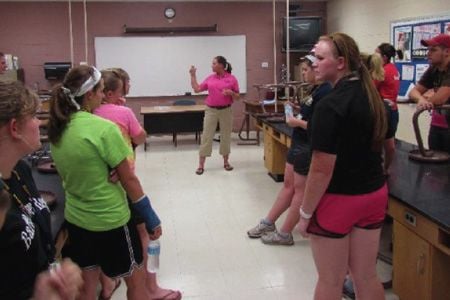CTE Curriculum
Prepare learners with CTE curriculum aligned to industry standards.
Case Study
Dual Credit Program Incorporates Online Career & Technical Education Platform
The Study
The nature of Career and Technical Education (CTE) in the United States is quickly evolving to meet the needs of a growing global economy. Widely known as vocational education for many years, training programs were offered to students seeking a career-focused education following high school. Today, CTE training programs are seeing more interest from students at the secondary, post-secondary and professional levels.

Universities, like Murray State University in Kentucky, are taking notice of the importance of such programs and developing curriculum to ease the transition between high school and college by offering updated CTE resources, industry certifications and dual credit courses to students.
“Too many students leaving high school are afraid of what comes next at the university level,” said David Black, coordinator of the Racer Academy at Murray State University. “CTE programs are meant to gauge the interest of current and prospective students and give them confidence after high school, whether they end up in a university environment or in a career.”
Murray State University developed the Racer Academy, a program that offers dual credit at the high school and university levels through courses in the university’s Hutson School of Agriculture, as a way to bridge the gap for students seeking quality CTE courses relevant to today’s industries. The implementation of iCEV, an online learning platform that delivers comprehensive CTE resources to student and educators, further supported the university’s desire to update its technology to complement instruction and learning.
Bridging the Gap
The Racer Academy of Agriculture and its dual credit program were originally developed under a grant from the USDA with an initial enrollment of 25 students. The curriculum is designed for use by qualified high school teachers to serve as instructors and facilitators for high school students to earn college credit before they graduate. Students enrolled in these courses are offered valuable insight on the transition between high school and college.
“One of the reasons students feel like they can’t succeed in higher education is that they don’t see a relevance in what they’re learning, or they may be scared that they can’t do the work,” Hutson School of Agriculture Dean Dr. Tony Brannon said. “We’re bridging the gap to prevent and change these fears through many of our introductory courses and resources like iCEV.”
iCEV is used widely in the Racer Academy as a tool for educators and students to rely heavily upon to learn the material. Students are encouraged to use the platform’s vast resource database in and out of the classroom as a supplement to a traditional classroom environment.

“High school dual credit courses can tend to be very lecture-oriented in comparison to the traditional university-level courses,” Black said. “We’re seeing a lot more engagement from our students as our university and dual credit courses incorporate iCEV technology and hands-on experiences. Students learn better if they have a visual and can actually experience what they are learning.”
The online platform is helping students enter their careers with an open mind. From an early stage, many high school students may not have direct experience working in their field.
Through iCEV they gain a greater understanding of what their field of study requires and gives them the resources they need to be successful as the program progresses.
"We’re seeing a lot more engagement from our students as our university and dual credit courses incorporate iCEV technology and hands-on experiences."
“Having the structure and depth of iCEV and the instruction in our classrooms has made all the difference for our cooperating high school teachers and students,” Brannon said. “Giving them the ability to visualize what they are learning through video and interactive activities is very important to increase engagement, grades and retention among students.”
To date, the Racer Academy serves over 400 students in 50 plus high schools across the state of Kentucky. High school students can earn up to 27 hours of agriculture college credits through Murray State before they graduate and, in combination with other university dual credit or AP classes, many have entered as a sophomore at the college level. Black also noted that in the future, students may be able to earn certifications in specific areas of agriculture and possibly use their hours of college credit toward an associate’s degree.
"Giving them the ability to visualize what they are learning through video and interactive activities is very important to increase engagement, grades and retention among students."
MURRAY STATE UNIVERSITY
MURRAY, KENTUCKY
About iCEV
Since 1984, iCEV has specialized in providing quality CTE curriculum and educational resources. iCEV is the most comprehensive online resource for CTE educators and students, offering curriculum for several major subject areas, including agricultural science, trade & industrial education, business & marketing, career exploration, family & consumer science, trade & health science, law enforcement and STEM education. iCEV also acts as a certification testing platform for industry certifications. Recognized companies and organizations utilize iCEV as the testing platform for their certifications. Additionally, iCEV offers Eduthings, a CTE data management platform that simplifies reporting for industry certifications, work-based learning, CTSO participation, and more. For more information, visit www.icevonline.com.




